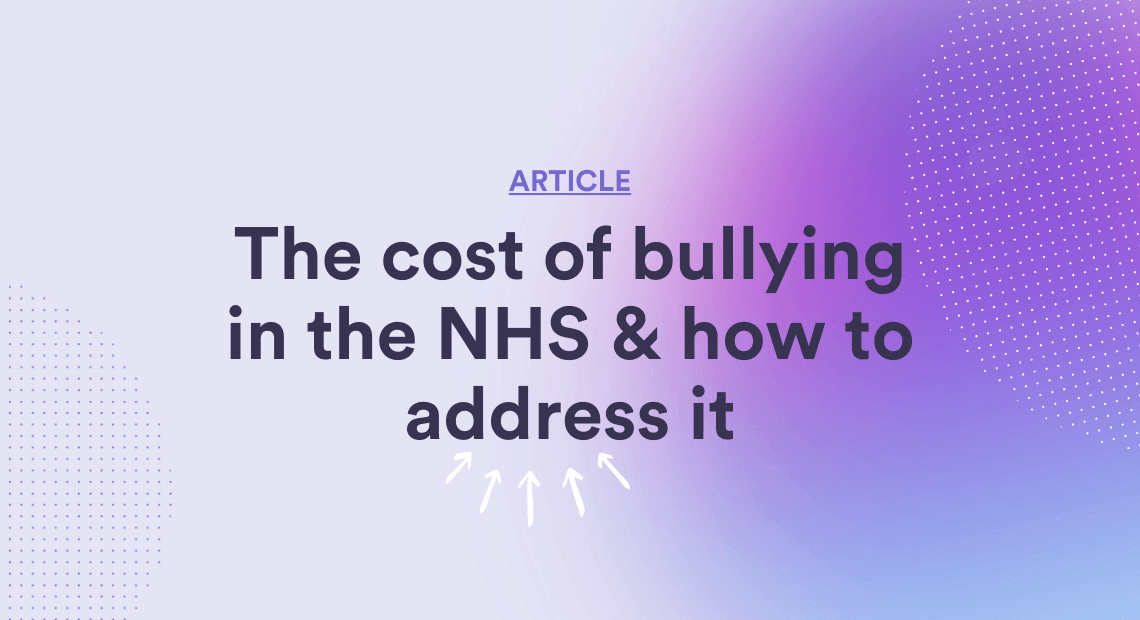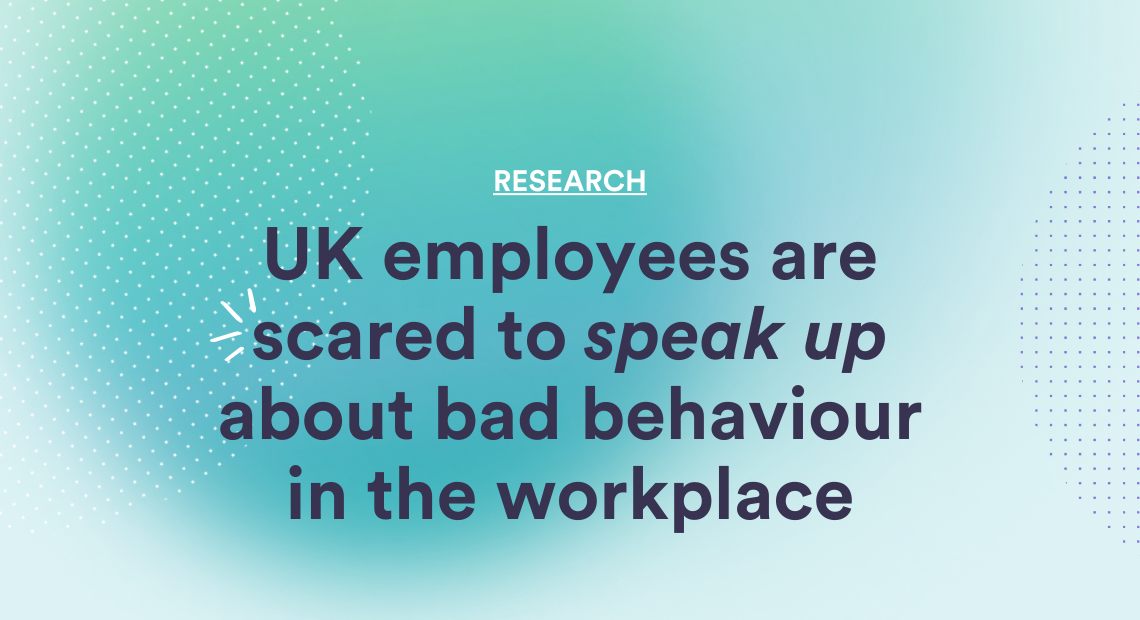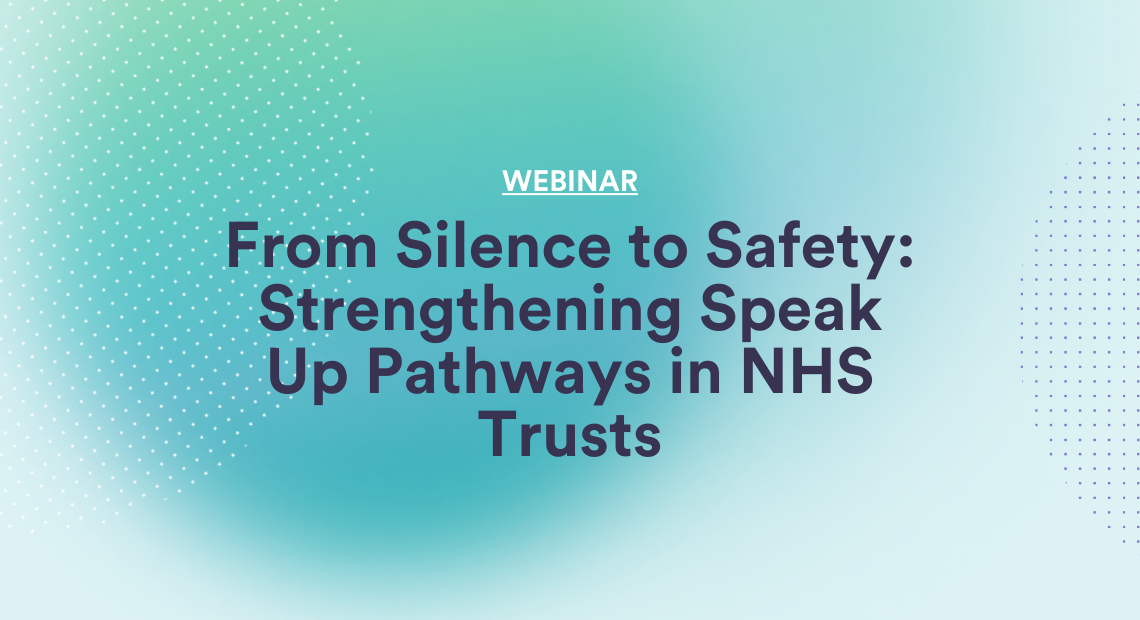The NHS People Plan places compassionate and inclusive cultures at the heart of the NHS, yet unacceptable levels of bullying and harassment still widely exists across the NHS, described by the BMA as a ‘corrosive culture’.
Bullying and harassment has a detrimental impact on NHS staff and directly affects the patients they care for, and according to the BMA costs the NHS billions of pounds each year*. Tackling bullying and harassment requires a multi-faceted approach that moves beyond policy and training. We explore the cost of bullying to the NHS, the impact on staff, patient care and share our expertise as culture transformation specialists to help identify solutions to reduce cost and improve culture in your NHS Trust.
- Bullying statistics in the NHS
- Cost of bullying to the NHS
- Wider impact of bullying in the NHS
- What can NHS Trusts do to prevent bullying, improve culture and reduce costs?
Bullying statistics in the NHS
According to the 2024 NHS Staff Survey, 17.6% of NHS staff have experienced bullying or harassment in the last year, with 9.5% of staff experiencing bullying from their manager. The statistics also show that bullying disproportionately affects ethnic minority groups (28%), disabled staff (23%) and LGBTQ staff.
Along with bullying and harassment, large numbers of NHS staff experience workplace incivility, with various reports suggesting between 70-90% of NHS staff are experiencing it. Workplace incivility can also be known as micro-aggressions and refers to low intensity behaviour that is rude and disrespectful to others, such as ignoring someone, talking over them or dismissing their ideas, which can create a hostile working environment.
Cost of bullying in the NHS
Toxic behaviour costs the NHS upwards of £2 billion every year and according to Kline & Lewis 2018, this is a conservative estimate.
Bullying and harassment contribute to a poor workplace culture, that contributes to poor mental health, increased sickness absence levels, low levels of productivity and low employee engagement. The statistics below show the breakdown of costs to the NHS:
- Sickness absence costs the NHS £483m every year
- The cost of covering sickness absence is £302m
- Sickness presenteeism due to bullying (where employees come to work unwell or not operating at their peak performance) costs the NHS £600m per year in reduced productivity and performance
- Bullying and harassment impacts wider productivity and is estimated to cost the NHS £575m
- If all bullied staff left their job, it would mean losing over 40,000 jobs, the cost of replacing them would be over £230m
- Lastly, the cost of industrial relations including litigation and compensation costs the NHS £83m annually
With NHS Trusts already under extreme financial pressure and budget cuts, the financial impact on the NHS from bullying and harassment is huge, indicating that urgent action is needed to address bullying in the NHS, not only to reduce costs but to improve the working culture and patient safety.
The wider impact of bullying in the NHS
Bullying and harassment in the NHS goes beyond financial pressure and has a much wider impact, particularly on patient care.
With NHS staff already experiencing high levels of workplace stress and burnout, when you combine this with bullying and a poor experience at work leads to low morale and high levels of presenteeism, which can contribute to increased errors and risks patient safety. When NHS staff are responsible for the lives of patients and the care they receive, there is often no room for error without serious consequences.
Bullying and a poor culture can also lead to:
- Absenteeism – putting staff under increased pressure, leading to even higher levels of presenteeism and increased errors
- Low morale – when the work environment is hostile, mental health is poor and NHS staff are under pressure, morale can be low and a breeding ground to spread discontent
- Disengagement – when morale is low, they begin to disconnect from colleagues and management. They don’t want to work together, leading to decreased teamwork and problem solving which is far from ideal in the NHS where teamwork is essential for patient outcomes
- Reduced productivity – all the above leads to reduced productivity levels and with a workforce already under pressure, the NHS needs staff who are performing at 100%.
What can NHS Trusts do to prevent bullying, improve culture and reduce costs?
Historically the NHS has emphasised the importance of policies, procedures and training to tackle bullying. Whilst these are all important components, Trusts need to go beyond this to facilitate individuals to speak up but also to tackle the wider culture in the NHS which means addressing root causes and active prevention strategies.
Develop a speak up culture
Developing a speak up culture takes time and requires a multi-faceted approach using all or some of the examples we explore below. It requires leaders to lead by example, demonstrating the behaviours that they expect from their team and confidence to call out poor behaviour. Creating psychological safety and an environment where employees feel safe to raise concerns without fear of the repercussions is key to eliminating bullying and harassment. By providing easy and safe methods to report and responding to reports consistently is also essential to building trust and transparency.
Improve reporting mechanisms
Current staff surveys are believed to not accurately capture the behaviours often associated with bullying and harassment, experiences remain undocumented, and we understand from the NHS Trusts we currently work with that they are either:
- using software that is not fit for purpose (i.e. trying to use patient clinical reporting software for staff reporting)
- using a central email address to manage reports, with an inbox managed by multiple people, therefore is not anonymous or secure
- rely on the NHS Staff Survey for data on bullying, harassment, sexual harassment because they can’t collect their own reporting data or pulling together a report is a complex, manual process.
Staff have a low level of trust in the reporting systems and processes and therefore do not speak up. One of the main barriers to reporting is not being able to do so anonymously. 62% of people would be more likely to report harassment at work if they could do so anonymously. By providing a named or anonymous reporting platform like the Report + Support platform by Culture Shift, it gives employees multiple routes to report, removing barriers to speaking up and centralising all your reports into an all-in-one reporting and case management system.
Training and support for managers
This requires a two-fold approach. With nearly 10% of NHS employees experiencing bullying from their manager, this needs to be rectified swiftly. Managers need to be trained in respectful leadership, and employees need a method of reporting that bypasses their manager, another reason why an anonymous reporting platform is essential. Secondly, managers play a key role in supporting culture change because they are the link between employees and leadership. Managers need to be trained to spot and challenge inappropriate behaviour, responding quickly and effectively to complaints. Often managers are brilliant at their jobs but do not have the correct skills to support employees when it comes to responding properly.
Work with your Freedom to Speak Up Guardian(s)
Along with managers, FSUGs play an essential role in helping NHS Trusts eliminate bullying and harassment in the NHS and facilitate informal and formal raising and resolution of concerns. FSUGs help to build trust and transparency between staff and leadership which is essential for a speak up culture. It allows workers to voice concerns and FSUGs ensure they are dealt with appropriately at the right level, working as a conduit between workers and leadership. They can also support leadership to roll out reporting platforms and engagement campaigns.
Respond quickly to complaints and issues
When you respond quickly and effectively to complaints about inappropriate behaviour, it signals to employees that their voice is heard and that action is taken when they do speak up. Another common barrier to reporting is the complaint that even if staff did report problematic behaviour, nothing would be done about it so organisations end up in a perpetual cycle
Address root causes
Identify primary causes of bullying and harassment, what behaviours are present in your Trust? What does bullying really look like in your organisation? How do behaviours manifest and how do different employees experience it? Delve deeper than the annual NHS Staff survey results to understand the culture better in your specific organisation. A culture audit is also a good place to identify current cultural risks and benchmark against in the future.
Use data and analysis to put proactive prevention initiatives in place
By collecting your own data through a reporting system like the one provided by Culture Shift, it means you can begin to analyse and identify cultural trends in your NHS Trust, without clear data it’s harder to fully understand the issues and the most effective intervention initiatives. Culture Shift’s platform has advanced data reporting capabilities; our dashboards provide at glance KPI metrics so you can easily see headline statistics and reporting hotspots with the ability to dive into the data in more detail to better target your intervention approaches. By collecting your own data, it allows you to monitor trends over time and the effectiveness of your culture change initiatives.
Assess the capability of current & future leadership teams
Research shows that leadership is the most important determinant of organisation culture. Leaders who are invested in culture and practice inclusive leadership, engage everyone at every level across an organisation to take responsibility for culture and inclusivity. By challenging behaviours and demonstrating the desired values of an organisation at every level, has the most impact on change.
Whether it’s working closer with your Freedom to Speak Up Guardians, introducing new reporting mechanisms to encourage anonymous reporting or scheduling wider training programmes, the positive outcomes from culture change initiatives far outweighs the current costs Trusts are incurring because of bullying.
Investing in an anonymous reporting platform, can help Trusts begin to create a culture of psychological safety and become a tool to assist Freedom to Speak Up Guardians to perform their role more effectively. Our reporting platform can relieve pressure on current staff by centralising the reporting process into a purpose built platform that is safe and secure, whilst also giving you vital information about your culture and underlying behaviours. The real question is, can your NHS Trust afford not to take action to prevent bullying?




